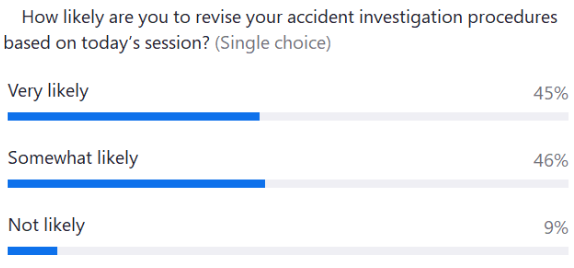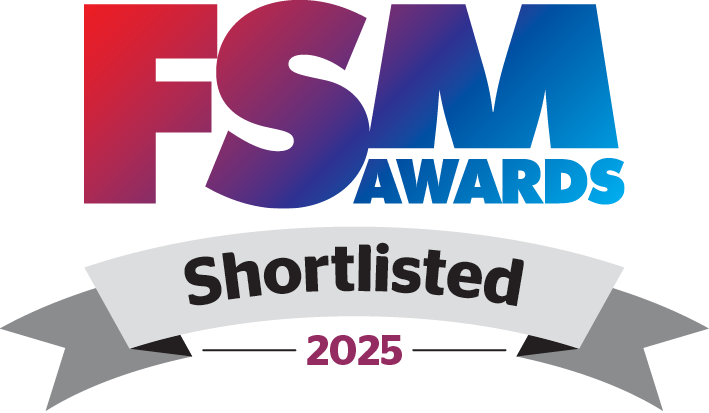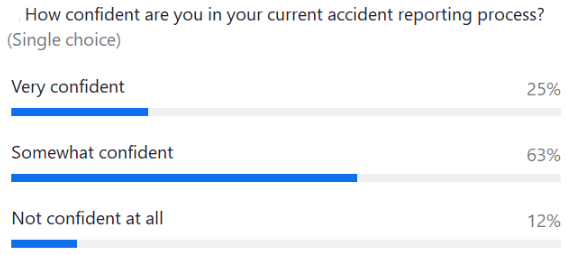
This blog is based on Judicium’s Health and Safety ‘Sofa Session’ from the 8th of January, with our resident expert Jim Liddy, CMIOSH. This session focused on: the practical guidance on accident reporting including what, when, and how; a step-by-step approach to effective accident investigation; and real-world examples to improve your procedures.
Poll 1
Practical Guidance on Accident Reporting: What, When, and How
What do you need to report?
You should report any incident that causes injury, illness, property damage, or near-misses.
There are legal requirements regarding reportable injuries, diseases, dangerous occurrences and gas incidents under the Reporting of Injuries, Diseases and Dangerous Occurrences Regulations (RIDDOR). A RIDDOR report is only required when the accident is work related, and it results in a reportable injury. These are the types of injuries that must be reported to RIDDOR:
- The death of any person
- Excluding suicides, the death of any person must be reported if it resulted from a work-related accident.
- If a person suffers a reportable work-related injury and dies due to that injury within one year (365 days), this must be reported as a work-related fatality.
- Regulation 4 of RIDDOR lists ‘specified injuries’ which must be reported including: fractures (other than to fingers, thumbs, and toes); amputation of an arm, hand, finger, thumb, leg, foot or toe; any injury likely to cause permanent blinding or reduction in sight in one or both eyes; any crush injury to the head or torso causing damage to the brain or internal organs in the chest or abdomen; serious burns (including scalding) which covers more than 10% of the body or causes significant damage to the eyes, respiratory system, or other vital organs; any scalping requiring hospital treatment; any loss of consciousness caused by head injury or asphyxia; any other injury arising from working in an enclosed space which leads to hypothermia or heat-induced illness or requires resuscitation or admittance to hospital for more than 24 hours.
- Work-related accidents must be reported where they result in an employee (or self-employed person) being away from work, or unable to do their normal work duties, for more than 7 consecutive days as the result of their injury.
- This period doesn’t include the day of the accident, but does include weekends and rest days.
- The report must be made within 15 days of the accident.
- Accidents to others who are not at work must be reported if they involve work activity, they result in an injury, or the person is taken directly from the scene of the accident to hospital for treatment to that injury.
- Employers must report diagnoses of certain occupational diseases, where these are likely to have been caused or made worse by their work.
You must include who was involved, what happened, and where it occurred in your report.
When do you need to report?
You must provide immediate notification for serious incidents, e.g., fatalities or major injuries.
There are legal deadlines for reporting (e.g., RIDDOR requires certain incidents to be reported within 10 days).
However, we recommend utilising internal policies for timely reporting such as ensuring reports are made within 24 hours.
How do you report?
Standardised forms (e.g., incident report forms) are available on the Health and Safety Executive (HSE) website.
You can make a report online via the HSE portal or manual submissions (ensure records are clear and complete).
For fatal accidents or accidents resulting in specified injuries to workers only, can be reported by phone.
Judicium recommends escalating serious incidents to higher management and external authorities as required.
What key information should you include?
- Date, time, and location of the incident.
- Detailed description of the event.
- Names and contact details of those involved and witnesses.
- Any immediate actions taken (e.g., first aid, evacuation, etc).
Poll 2
.png)
A Step-by-Step Approach to Effective Accident Investigation
- Immediate Response
- Ensure safety: Make the area safe, provide first aid, and prevent further harm.
- Secure the scene to preserve evidence.
- Data Collection
- Interview those involved and witnesses.
- Take photographs and videos and gather physical evidence (e.g., damaged equipment).
- Review relevant documents such as risk assessments, training records, maintenance logs.
- Analyse Information
- Identify root causes using techniques like the 5 Whys.
- Separate immediate causes (e.g., slipping on a wet floor) from underlying issues (i.e., lack of signage or cleaning schedules).
- Develop and Implement Corrective Actions:
- Address root causes to prevent recurrence (e.g., implement proper cleaning procedures or training).
- Ensure corrective actions are SMART (Specific, Measurable, Achievable, Realistic/Relevant, Time-bound).
- Document and Communicate Findings:
- Prepare a report outlining findings, causes, and recommended actions.
- Share with relevant stakeholders, including management and safety committees.
- Follow-Up:
- Verify that corrective actions are implemented.
- Monitor for effectiveness and adjust as needed.
- Update risk assessments and policies based on lessons learned.
NB: Judicium offers CPD accredited training for accident reporting and investigations, which can be tailored for your school or trust. This can be in person or virtual depending on your requirements.
Poll 3

Real-World Scenarios to Improve Procedures
Example 1
A Slip and Fall in a School Corridor- Incident: A teacher slipped on a wet floor during cleaning hours.
- Findings: No "wet floor" sign; cleaning schedule coincided with high foot traffic.
- Corrective Actions: Update the cleaning schedule, train staff, provide visible signage and check if the risk assessment needs to be reviewed.
Example 2
Fire Safety Drill Incident- Incident: A student was injured while evacuating during a drill.
- Findings: Crowding at exit doors and lack of clear instructions.
- Corrective Actions: Revise evacuation plans, install directional signage, conduct regular training and amend the fire evacuation plan.
Example 3
Machinery-Related Injury in a Workshop- Incident: An employee suffered a hand injury while operating a machine.
- Findings: Machine lacked proper guarding; inadequate training.
- Corrective Actions: Install guards, retrain staff, enhance maintenance checks and review the risk assessment.
These structured practices will enable schools and MATs to strengthen their approach to accident reporting and investigation, ensuring a safer and more compliant workplace.
Top Tips
- Ensure all staff know when and how to report incidents.
- Involve the right people in investigations and focus on root causes.
- Keep documentation thorough but concise - this can save time and resources later.
Helpful Links:
Judicium Education’s Health and Safety Advisory Service is designed to support schools, firstly, in ensuring a safe working and learning environment, secondly, in complying with the legal requirements imposed on them as employers under the various Health & Safety laws and regulations. For more information, please visit here.
If you require any support in any of these steps, or would like to talk to someone surrounding some support for your school please do not hesitate to call us on 0207 336 8403 or email Georgina.decosta@judicium.com.
The Health and Safety Service is also providing accredited training courses, including eLearning with specific modules ranging from courses designed for premises managers and SLT to all staff offerings and fire warden training: https://www.judiciumeducation.co.uk/elearning
We also offer live, exclusive training options: https://www.judiciumeducation.co.uk/training
To review Judicium’s forthcoming sofa sessions please click here.
Follow us on Twitter - @JudiciumEDU
© This content is the exclusive property of Judicium Education. The works are intended to provide an overview of the sofa session you attend and/or to be a learning aid to assist you and your school. However, any redistribution or reproduction of part or all of the contents in any form is prohibited. You may not, except with our express written permission, distribute or exploit the content. Failure to follow this guidance may result in Judicium either preventing you with access to our sessions and/or follow up content.
Related content

Discover why Judicium has been shortlisted for Fire Safety Consultancy of the Year at the 2025 FSM Awards, recognising our expert support for schools and trusts in delivering sector-specific, compliant, and practical fire safety solutions.
.png)
This blog is based on Judicium’s Health and Safety ‘Sofa Session’ from the 12th of March, with our resident expert Mike Wright.

This blog is based on Judicium’s Health and Safety ‘Sofa Session’ from the 26th of February, with our resident expert Loretta Igbe.

This blog is based on Judicium’s Health and Safety ‘Sofa Session’ from the 6th of November, with our resident expert Isthar Pearce.
.png)
This blog is based on Judicium’s Health and Safety ‘Sofa Session’ from the 23rd of October, with our resident expert Andy Camroux.

This blog is based on Judicium’s Health and Safety ‘Sofa Session’ from the 16th of October, with our resident expert Rachel Kitchen.



H&S